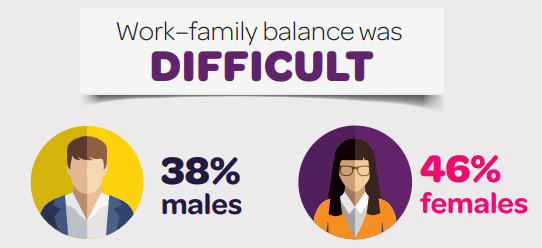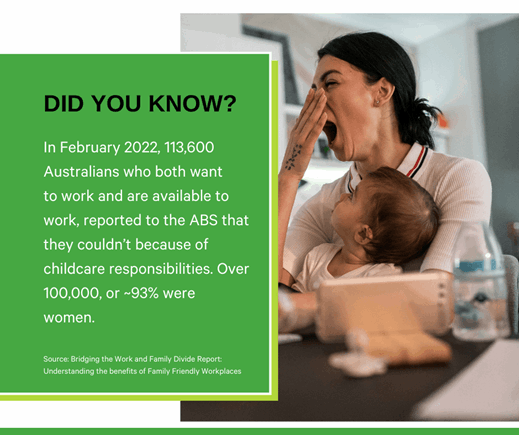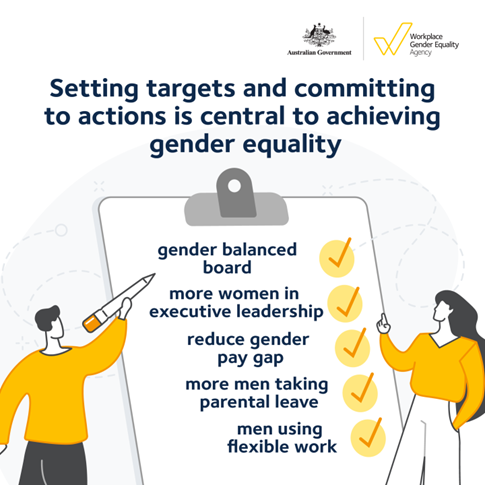Carers struggle with work-life balance during pandemic
It may come as a surprise to many people, but Australia actually has a long way to go on work-life balance, paid parental leave and affordable childcare when compared with the majority of other OECD countries.
It’s no secret that the COVID-19 pandemic brought significant changes for families in their participation in employment and experiences of work-family balance. A report published by the ARC Centre of Excellence in Population Ageing Research (CEPAR) found that the pandemic has generated new pressures for those with care responsibilities. The report indicated that younger mature carers – defined in the report as those between 45 and 54 years old – struggled more than non-carers to meet their family/care responsibilities. Female carers in particular fared worse than their male counterparts.
Similar gender differences can be found in a different study that was conducted at the end of 2020. Families in Australia Survey reveals that those working at home and actively caring for children at the same time very often reported difficulties balancing their work and care responsibilities. When parents with at least one child aged under 18 years were asked about their work-family balance, 38% of males vs. 46% of females reported it was difficult to maintain work-family balance.

Although the proportion of women in the workforce almost reached parity with men, and there is a shift showing a more equal sharing of household tasks, for the most part the division of care responsibilities and domestic labour continues to land heavily on women, with women representing 7 out of 10 primary carers
Gender equality – still a long way to go
The pandemic has certainly highlighted that for many families and couples, gender inequality is an issue that still needs to be tackled. The compounding result of the disproportionate share of unpaid care is that women are:
- less likely to be able to engage in full-time paid work
- more likely to work part-time or casually
- more likely to work in occupations or industries that offer more flexibility
- more likely to experience interruptions to their career
- more likely to have a substantially lower superannuation balance at retirement
- more likely to experience depression or anxiety than non-carers

Credit: Bridging the Work and Family Divide: Understanding the benefits of Family Friendly Workplaces
What can employers do to help?
One of the ways employers can help employees manage competing pressures is by making workplaces more family-inclusive, thereby relieving the pressure on caregivers, promoting women’s economic participation and encouraging men to participate more actively in a caring role. With more than 10% of the Australian adult population acting as carers, supporting people to remain in the workplace while balancing their caring needs is critical.
 Credit: WGEA Scorecard 2022: The state of gender equality in Australia | WGEA
Credit: WGEA Scorecard 2022: The state of gender equality in Australia | WGEA
Research into men and caring roles in Australia has found that normalising and modelling flexible working arrangements can assist men to balance work with their caring responsibilities. There is mounting evidence to indicate beneficial outcomes when fathers take leave: for organisations, fathers, their partners and their families. Despite this and increasing numbers of men wanting to take up carer opportunities, men still report widespread carer related stigma.
At Transgrid, we announced a change in our parental leave policy in March 2022, providing all parents with access to 20 weeks paid primary carer leave (or 40 weeks at half pay), regardless of their gender, because we understand when we share the responsibility of childcare across all parents, we make it easier for women to participate in the workforce and progress their careers. We also make superannuation contributions on both paid and unpaid portions of primary carer parental leave, to help improve economic outcomes for women who are often disadvantaged at retirement by taking parental leave.
A healthy sign of an inclusive and equitable workplace is seeing parents of all genders taking parental leave equally, and we were pleased to see that 62% of people taking primary care parental leave in FY22 were men. Our gender-neutral parental leave policy also provides LGBTQI+ employees equal access to options for balancing caring and career responsibilities, regardless of their parenting role or birth parent status.
There is strong research evidence that when employees of all ages perceive they have control (perceived autonomy) and flexibility of their work, work-life conflict is reduced. That’s why apart from parental leave, we also offer hybrid and flexible working. Through hybrid working, parents have a new measure of built-in flexibility that they didn’t have access to pre-COVID, helping to shape a more flexible and family-friendly way of working.
Recently we have been certified by Family Friendly Workplaces as a Family Inclusive Workplace, based on our policies and practices which support our people to balance care and career responsibilities.
We understand that shifting stereotypes takes time, but hopefully with family-inclusive policy in place and more men encouraged to take parental leave, dads can realise that caring and a career don’t have to be mutually exclusive.
As our CEO Brett Redman put it, "When all parents, including men, have equal access to become primary carers for their children, the playing field is levelled, enabling women to return to the workforce and for the parenting load to be shared."
Employee story: Li-Wen Yip
Here's Li-Wen Yip, our Energy Transition Specialist – Innovation & Energy, sharing his experiences on taking parental leave:
Men can take more than 2 weeks of parental leave
Very early in our relationship (on the third date, I think) my wife and I agreed that our relationship would be built on equality. This meant, amongst other things, taking equal responsibility for the full-time care our son would need in the first year of his life. In our circumstances, that meant my wife taking 6 months of maternity leave, then me taking 6 months of unpaid leave - or if necessary, quitting my job and then finding a new one. So when I joined Transgrid, one of the things that attracted me was the "share the care" leave policy, which gave dads 6 weeks of paid leave to take over as primary carer after mum’s maternity leave ends. (Transgrid has since replaced “share the care” with 20 weeks of gender-neutral parental leave in March 2022.)
I took 4 months off which was probably the best 4 months of my life, and it set me up with all the skills needed to continue being a fully involved parent.
The pay wasn't even that important - it was the signal that at Transgrid, it is accepted and encouraged for men to take extended time off work to properly get to know their children and learn how to be great dads.
Men can choose to work part time
For the past 18 months my wife and I have both been working part time (3.5 days/week), which has allowed us each to dedicate 1.5 days a week to raising our 2.5 year old son. Going into it, I was quite anxious about how I might be judged or discriminated against, given that traditionally men are expected to continue working full time after having children (and in fact on average, men tend to *increase* their working hours after having children). But I have been pleasantly surprised: my managers and colleagues at Transgrid and Lumea have been very accepting and supportive, and it has had minimal impact on my ability to participate and contribute at work. There is still some way to go outside Transgrid though - I've found the fastest way to shun a recruiter is to ask "is this opportunity available on a part time basis?"
Being a great dad
Being a great dad used to mean working hard to provide for your family, and getting home in time to read them a story before bed. Modern dads are now much more involved in day-to-day parenting! I feel quite lucky that Transgrid's parental leave and flexibility policies have allowed me to take on an equal share of the parenting, which has allowed me to get equally good at it and develop an equally close relationship with my son. My son's favourite day of the week is Thursday - "special day with Daddy" - which makes me feel like a great dad.

